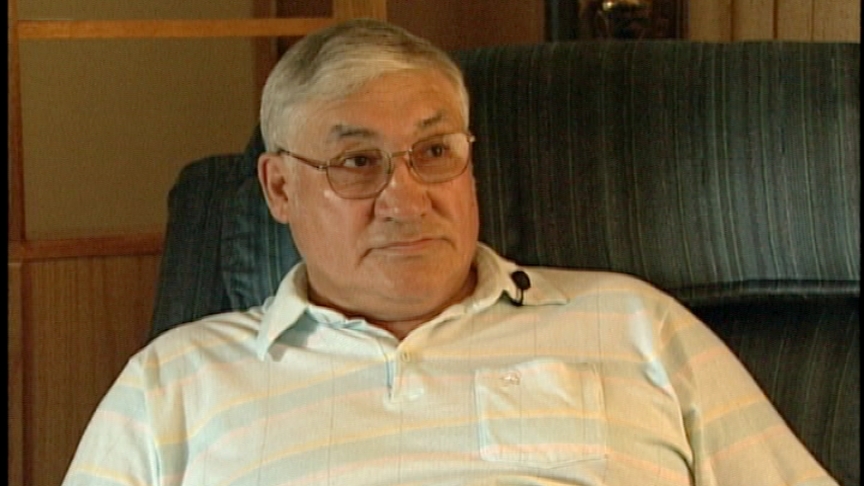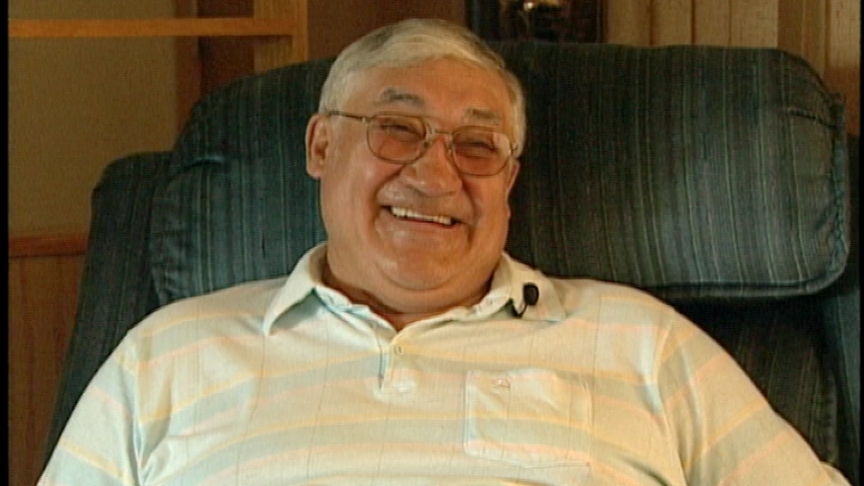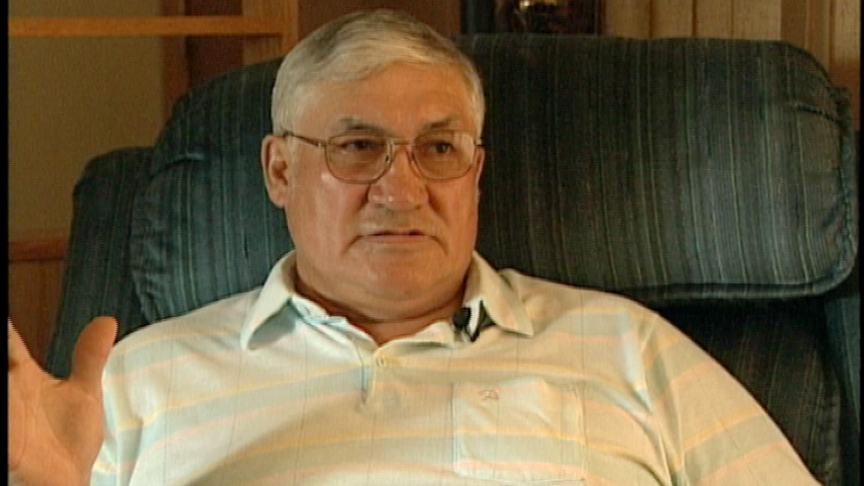PPCLI Duties
Heroes Remember
PPCLI Duties
Transcript
We were on counter attack for the Black Watch, Brit Black Watch
because we were commonwealth division over there. So we were
counter attack company or counter attack battalion for the Black
Watch Battalion. We're about 20 miles behind them out of
artillery range and they got, they got hit the night that night.
We were there a couple nights I think no, no we were there longer
than that. We were there about a week or so and then they got
hit and you could see it you know. It started about ten o'clock
at night and it went on to about two then the trucks came in and
we had to move up and we had to do a counter attack to take that
position over and... well it was a counter attack, but it was a
company attack. That, that's a big attack you know. So we went
up there. We lost 16 men. They lost 76 men. We got the position
back, but the, the colonel of the Black Watch actually called
down artillery on his own position. The Chinese over ran them
because they, they, they come in there with thousands of guys
you know. Then I went back since then, you know you had to be in
good shape to do, do those hills and that's attacking right up
hills because that's the way the positions were dug in. They were
dug in on, in on the, on the hill eh. So they had to attack.
That's the way the done it. It's kind of a, a wake up call for me
for you know. So we did 2 weeks up there, did a few patrols then
they relieved us with another, I think their band, they put, they
put another company together and they came over and took back
their position so. So we moved back to our own position where we
were, counter attack row and then, then we weren't too happy
about this. We had to go back and take over that position. Now
that was our position. I didn't know how long we were going to
stay there. Well it's usually on, on a position like that is a
month you know or three if it's kind of quiet,
depending on how, on how the division is set up you know.
Then I went back in. We went back in and
then I, I was going down for, for blankets and rations and, and
I stopped at the MA's bunker and I was talking to him. We had, we
had this stuff on a stretcher and all of a sudden the mortar
start coming in. I had a bullet proof vest on so I was not too
bad. I got hit and the other, the guy that was carrying the
stretcher with me, got it in the back and he didn't have a
bullet proof vest on. So then we were, we were evacuated from
there to our mash no Norwegian mash. I went to Norwegian mash. I
think they flew him out to someplace else. He went out with
a chopper and I went out with just one of those ambulance
trucks, got operated on, went back to our own, our own position.
It's they had like guys getting wounded so they had a holding
wing for that. People... right after you come out of the mash
and the mash handled only operations eh and then for recovery
you went to your own our, our, our medical people had our own,
we had our own layout down there so. I stayed there for I think
about 2 weeks then they sent me to Seoul. BMH in Seoul, British
Army Hospital. I stayed there for another 7 days and then I went
to a rest camp and stayed there for, because... it was taking
quite a while for after I'd find out why all this rest you know.
It was quite a while to heal over there so that's why they,
they give quite a bit of rest time.
Then I went back to join my company (inaudible) they had
finished The Hook finally. Oh my God, it’s on one of the Battle
Honours the, the position. We went to Samichon Valley and but
in the meantime everything, everything well we, it didn't go
too bad, but the guys were already hardened, you know battle
hardened. That was, that was a heck of a position. That position
in 355 the RCRs really got, they really got it there. You know we
well I wasn't there but they, they, you, they could see it
happening. Well you could see this stuff happening you know
when their getting shelled if we're down in the valley on a
patrol. Especially Samichon Valley that's what we were doing,
mostly patrolling out of there because it was pretty quiet. Did
one fighting patrol out of there and one well I did about 2
listening patrols and one RECCE and that was basically all we did
Interviewer: Would you describe to me what the different types of
patrols were?
Well listening patrol was you'd go in front of your positions,
usually 3 guys. NCO, signaller and a private, but the Chinese
were all over the place you know. People didn't think that you
know that there was any enemy out there, but there was. We were
using phone, field phones and we'd have to carry the wire eh.
They were cutting the wire on us. So they were in the back of us
and we knew that so you know, really kind of leery going back.
We have a set with us you know it was only a 26 set, but we
could talk back to our CP if we had to, but the thing is you
know it's radio silence so that’s why we, we did the wire thing.
But they knew you know, like they're not, they weren't stupid.
They was Chinese not and you'd sit there and this is what you,
you, you could sometimes they'd go right by you, you know. You
know, you could hear them talking and then the, the RECCE patrol
was your company would try to find out what, what is going on
you know. They'd send you in a little further, hang around the
mine fields. We knew where the mine fields, but that's, that's
what the, the listening patrol would go in front of your mine
fields and sit there eh. Well, the mine field was there so if
anything's going on well you'd know eh, but the thing is you
gotta walk about 5 miles to get there and then come back down
around yourself to get back to your position.
The fighting patrol is around 20 men and that's the bad one.
Somebody's going to get hurt. It's an advance to contact,
you're going to make contact and there's going to be fire
fighting usually, but if you miss out, you miss out. That's what
would happen to us. We went to our objective and never hit
anything so. We were lucky. Usually you'll go in, you'll go
out at one position and come back in at another one.
Like you'll come out maybe say you're leaving Charlie company
lines you'll come, come in, in "A" Company lines, but they
know you're coming. But you go right around and that's where
you'll, your, you, you never try to go back on where you came
from because you know they'll probably got that figured out so
they'd lay fire down on you pretty quick, like artillery or
mortar. So, so we had a lot of guys get hurt on, you know.
Because they had those burp guns eh, deadly little weapons
because 72 rounds in just one burp and somebody's gonna get
hurt if they, if they ever get, if you ever get one you're going
to get about 10 of them. So we had quite a few get hurt with
them, but that's the job so we had to do it eh.
Description
Now in Korea, Mr. Petit describes some of the duties of his PPCLI unit.
Claude Petit
Claude Petit was born on October 31, 1935, in Duck Lake, Saskatchewan. He had one brother and a sister who passed away shortly after her birth. Mr. Petit's family has a long history of military service; his father fought in the Second World War and many other members of his family participated in conflicts dating back to the Riel Rebellion. Mr. Petit enlisted in the Korean War at the age of 16 and served with the 1st Battalion of the Princess Patricia Canadian Light Infantry.
Meta Data
- Medium:
- Video
- Owner:
- Veterans Affairs Canada
- Duration:
- 10:17
- Person Interviewed:
- Claude Petit
- War, Conflict or Mission:
- Korean War
- Branch:
- Army
- Units/Ship:
- Princess Patricia's Canadian Light Infantry (PPCLI)
Related Videos
- Date modified:





